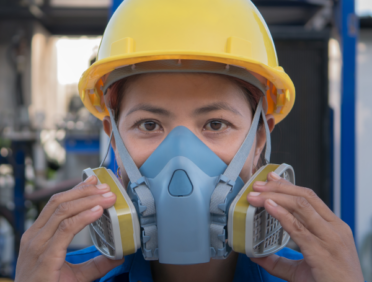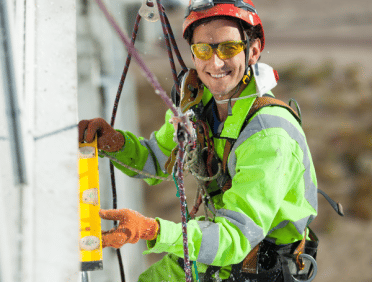Construction work or any type of trade work is dangerous. Not only for the customers and general public but also for the tradespeople themselves if they are not properly skilled and trained.
Of course, much of the work you will be doing is going to be hands-on and, therefore, so will your learning. However, you will still need some compliance training to ensure you know how to keep yourself and others safe too.
If you own a construction or trade company and want to ensure that your colleagues have the training they need, then take a look at our guide to which Learn Q courses are most relevant to the construction industry.
Mandatory Courses
The best place to start is by learning which courses you must provide to the colleagues working within your business to comply with UK legal requirements.
We suggest that these courses are made a part of your onboarding process so that you can ensure that all New Starters go through the relevant training.
The main legislation that is applicable to finance businesses are:
Mandatory courses for construction and trades include:
Asbestos is still a current issue in the construction industry. In fact, it is responsible for as many as 5,000 deaths every single year. This means that it is incredibly important to protect everyone who could be exposed to it whilst they are working. A simple way to do this is to offer this asbestos awareness course which covers all the basics that need to be learnt and how to prevent exposure.
Many roles or tasks within construction are going to require the person to work at height. This could be due to roofing or scaffolding. Whatever the reason for them to be at height, this training course is designed to prevent injuries and keep everyone safe.
One of the sets of courses that are likely to be most relevant to working in construction has to be health and safety. These courses are designed to keep everyone who works on site (and those who are present but not working) safe and ensure that accidents and injuries are kept to a minimum.
There is a very good chance that you are going to need to lift and move large and heavy items when you work in construction. This means that manual handling is definitely a mandatory training course. Manual handling covers the basics of being safe when it comes to moving and lifting any type of load and how to protect yourself and those around you from any injuries occurring.
Fires can happen in any workspace, and it is important to know how you can deal with them and what to do in the case of an emergency. Fire safety is relevant within the construction industry, and it is a mandatory set of training to provide all colleagues with.
GDPR is something that many businesses have had to get to grips with, no matter their industry. It was created and implemented to ensure that customer’s data is handled correctly and that they feel safe and protected with what a business will hold on them. Even within the construction industry, there is always a chance that you will hold data on your clients and ensuring that everyone knows how to protect this data is key.
Money laundering is a financial crime that is most prevalent in businesses that handle a large amount of money, and it can happen in the construction industry. Of course, many of your colleagues may not feel that they are at risk of dealing with money laundering, but every single person within your business should be aware of what it is and what they should be looking out for.
Bribery is another activity that you may not think will happen to all colleagues, but it does. Bribery has no place in business and is covered by the Bribery Act 2010. Ensure that your colleagues can protect themselves and the business with this Bribery Act Awareness course.
It is always thought that construction is a role that is away from computers and other display screen equipment, but the truth is that this training course can still be relevant. There is always a chance that you may need to access a computer of some kind when you are working in the industry, which means that your colleagues are going to need to have this mandatory training course.
Strongly Recommended Courses
As well as the mandatory courses that can be offered to your colleagues, here at Learn Q, we can also offer training courses that we strongly recommend that you provide. Whilst they may not be a legal requirement, they definitely have their place and being able to provide them will help to keep your colleagues and your business safe too.
When you own a company, you need to appoint health and safety colleagues who are responsible for all the key aspects of health and safety and keeping those on-site safe. Whilst this is the case, you still need to ensure that everyone on site has the knowledge on how to keep themselves safe too.
By offering them Risk Assessment Awareness courses to attend, they are going to know what could be deemed as a risk and what they need to do should they identify one.
Even with the best efforts, there is always still a chance that injuries can occur during construction. This is why the RIDDOR or Reporting of Injuries, Diseases and Dangerous Occurrences Regulations Awareness course is so important.
This course covers the main points of the RIDDOR legislation and also ensures that those responsible can make appropriate reporting should they need to.
COSHH stands for the Control of Substances Hazardous to Health, and it is a training course that can often be relevant to materials and substances used in construction. The COSHH Awareness course looks at the 2002 COSHH regulations and provides guidance to help colleagues to understand what makes a substance hazardous and how it can be dangerous to someone’s health and how they need to be dealt with and managed.
Incorrect water handling can sometimes cause the issue of legionella, which means that offering up the legionella awareness course can be a great way to keep those who may end up using water systems put in place during your colleague’s working day as safe as possible.
You may not be able to always prevent a slip, trip or fall in the workplace, but you can do whatever you can to limit the chance of this happening. Providing your colleagues with this training course helps them to recognise the best steps to take to protect themselves and their colleagues and also what to do should a trip, slip or fall happen.
It is important that every single industry recognises the importance of dealing properly with workplace harassment. This is even true for construction. Rather than brushing harassment to the side and letting it blow over, this training course helps colleagues to identify what could be workplace harassment and know-how then it should be reported and dealt with.
Recommended Courses
Some courses fall under our recommended list. They are not a legal requirement, but they are courses that could provide key skills that are needed to enable every person working within the team to do their job to the best of their advantage.
Many of the recommended courses that we provide here at Learn Q are designed to help managers effectively manage and lead their team, even when it is tricky to do.
Knowing how to manage the people that work with you is one of the main elements of being a manager. With this in mind, we offer this managing people course, which can help managers of all levels to learn all the skills that they need to enable them to effectively lead their team and ensure that they all come together.
One of the hardest parts of being a manager is being able to effectively appraise colleagues in order to manage their performance. Staff appraisals can be tricky to do, especially when you need to deliver some constructive criticism. This is why our Staff Appraisal Skills course can be an incredibly helpful training course for your managers to attend and learn more about.
Conflicts can and do happen, especially in high-pressure working environments. Knowing how best to resolve them is an important skill to provide managers with. This can help to stop conflicts from growing and from becoming something that is even harder to manage.
Team Management
Health and Safety
Mental Health Remote Working
Mental health and well-being are important no matter the industry that you work in. Even if you are a remote worker who spends much of your time alone or in a smaller team, this Mental Health Remote Working course is there to ensure that every person recognises their part to play in their own mental health and how they can manage to work alone or to work with very few people on a day to day basis.
How often do colleagues need to take this training?
The answer to the question of how often the courses should be repeated is not always as straightforward as you may hope and there is not necessarily a set answer across all organisations. For many courses it will really depend on the type of course that is being taken and the nature of what you do. Ideally, the refresh regularity should be based on a thorough risk assessment of your business and tailored to the unique needs of your organisation and customers.
That said, if you are looking for a general rule, then we would say every 12 months is good practice for most of the courses that we offer.
There are some exclusions to this that do need to be kept in mind:
- In the case of an internal incident- if there has been an incident within your business where an employee, a customer or a client has been injured, then this then means that it is important to refresh all staff members with the relevant training in order to minimise the chance of it happening again.
- In the case of an external incident- if there has been an incident outside of your business but within your industry, then this could be a time to refresh relevant training. Of course, this will only be applicable if the incident is severe and you think that it poses a risk to your business and those who work within it and those who are clients. At the very least, it is going to be worthwhile refreshing their Health and Safety training.
- If a process changes- if an internal process has changed, then it is going to be a good time to refresh any training that relates to this process. Particularly if you feel that it might impact what has been previously learnt.
- If you bring in new equipment- if you bring in new equipment for your staff members to use, then you should provide them with training that is relevant to this change. Even if the change is slight, after all, prevention is always better than cure.
- If there has been a change in the environment- if you move premises or you have some changes made to where you work, then you will need to think about some of the training. This includes COSHH and Health and Safety.
To download a .pdf of this blog, please click here












